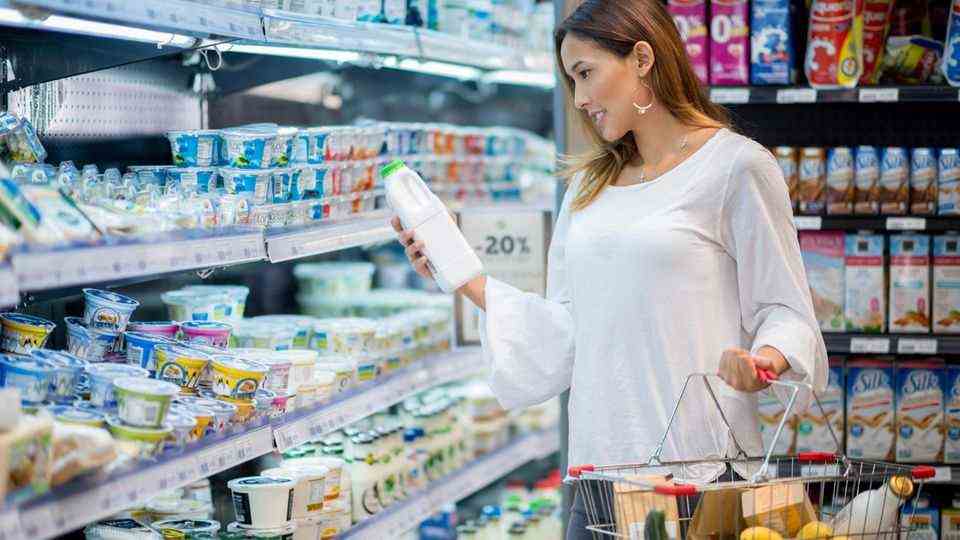Price labels, deposit, plastic bags
At Aldi, Lidl, Edeka, Rewe and Co .: This will be new in the supermarket in 2022
At Aldi, Lidl, Edeka, Rewe and Co .: There will be some changes for consumers in the supermarket in 2022
© Goodboy Picture Company
When shopping in the supermarket, consumers expect some new rules in 2022. What has changed at the turn of the year at Aldi, Lidl, Edeka, Rewe and Co. and what innovations are still pending.
At least verbally, the new Agriculture and Food Minister Cem Özdemir is slowly warming up. In the past few days, the Green politician railed against “junk prices for food” and then against food waste. He wants supermarkets to donate more and throw away less. He considers the criminality of containers to be “absurd”. And besides that, Özdemir is also the man with the mammoth task of organizing the climate-friendly conversion of German agriculture.
It will take a while before the words are followed by actions and laws that the customer notices in the supermarket. But the old government was not completely inactive either. Some things in shopping are therefore already changing now or in the coming months for consumers. An overview of new laws, rules and plans.
Changes at Aldi, Lidl, Edeka, Rewe and Co .: a lot of new things in the supermarket
State animal welfare label
The new government has already named one point very specifically in the coalition agreement. A binding animal welfare label is to come as early as 2022, which includes keeping, transport and slaughter. So far, retailers (apart from organic goods) have only printed their own four-stage husbandry label on packaged meat. Their informative value for animal welfare is considered to be limited.
Type of husbandry labeling for yoghurt and cheese
When it comes to labeling milk and dairy products, some supermarkets and discounters are already taking a step forward from January. Rewe, Edeka and other retailers have announced that they will also print a type of husbandry label on products such as cheese or yoghurt, as is known from meat.
End of chick killing
Buying eggs is now possible with a clearer conscience. Because since the beginning of the year, chick killing has been banned in Germany. Around 45 million male chicks have been killed annually after hatching because they do not lay eggs and it was not worth rearing. Instead, a method is now used with which the sex can be determined at an early stage in the not yet hatched egg.
Plastic bag ban
From January 2022, the typical single-use plastic bags in supermarkets and the like will finally be banned. Plastic carrier bags with a wall thickness of 15 to 50 micrometers are affected. On the other hand, thin fruit and vegetable bags and thicker plastic bags that are intended for multiple use are still allowed. Deutsche Umwelthilfe is also calling for a ban on the so-called shirt bags that customers use to pack loose fruit and vegetables. But the legislature argues that this would only lead to more prepackaged food.
More returnable bottles
The deposit obligation will be extended to all non-returnable plastic beverage bottles from January 1st. Juices, smoothies and mixed alcoholic drinks are then also affected. As with plastic beer or mineral water, a deposit of 25 cents is due for them. The measure is intended to increase the recycling rates.
Return of electrical devices
The return of electronic scrap is made easier so that defective cell phones or old razors and electric toothbrushes are not incorrectly disposed of in the household waste. From July 1 at the latest, consumers should be able to hand in small devices with an edge length of up to 25 centimeters in every supermarket and discounter that is larger than 800 square meters.
Price labels for perishable goods
Fresh foods that are about to expire are often offered at reduced prices. So that retailers do this more often, the rules for the pricing of such products are being relaxed. Until now, a new price tag with the exact new price had to be printed for the reduced product. From the end of May 2022, a simple note such as “30 percent cheaper” is sufficient. The simplified rule is intended to help avoid food waste.
New organic products
On January 1st, the new EU organic regulation comes into force, which brings various new rules for organic products. In the future, for example, agricultural products such as salt, beeswax, cotton or wool can also be offered in organic quality.
Also read:
What will change for us in everyday life in 2022
Who gets everything more money in 2022



